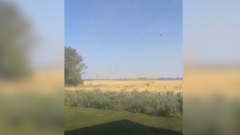
The US – and the world – should be worried the bird flu could become the next pandemic, warned an infectious diseases and Covid-19 expert.
H5N1 cases in humans who had contact with sick animals have been recorded in all 50 states and the avian flu is widespread in wild birds worldwide.
As of Wednesday, there were 70 human cases in America and one death, according to the Centers for Disease Control and Prevention (CDC). There is no known person-to-person spread and the US’s national public health agency rates the current risk to the population ‘low’.
But an expert who hosts a weekly video series on the latest infectious diseases and public health issues said the US should be concerned about the bird flu potentially worsening to a worldwide epidemic and beyond.

‘Yes, absolutely it could be the next pandemic,’ Dr Robert Murphy, a professor infectious diseases and biomedical engineering at Northwestern University, told Metro on Wednesday.
‘We have to (worry) because it could be another pandemic. It definitely could be.’
While the good news is there is no evidence of human-to-human H5N1 transmission to date, it is ‘a kind of virus that mutates very easily and frequently’, he said.
‘If the mutations continue and change the virus so that it could transmit easier human-to-human, we’re in trouble,’ said Murphy, who is executive director of the Havey Institute for Global Health at the university’s Feinberg School of Medicine.

The first and only human death linked to the current outbreak of the avian flu in the US was in January – a Louisiana patient over the age of 65 who was hospitalized with severe respiratory problems.
But around Asia, the mortality rate has been higher. From January 2023 to December 2024, the fatality rate in 261 cases of H5N1 in Australia, Cambodia, China, Laos and Vietnam was 54%, according to the World Health Organisation (WHO)’s Western Pacific Region.’
‘We don’t know if that’s a reporting phenomena or how real that is, but it’s most likely more lethal than the typical type A flu, so that’s the big fear,’ Murphy said of the bird flu.
Type A influenza is a common infection that can lead to widespread flu outbreaks and be serious.

Compared with the lead-up to the coronavirus pandemic, though, more preventative measures have been pursued globally.
The Biomedical Advanced Research and Development Authority (BARDA) within the US Department of Health and Human Services, and similar agencies in other countries, have been stockpiling millions of doses of avian flu vaccines for humans.
‘They’re being held in stockpile in case this takes off,’ Murphy said.
‘So that is happening, but are we prepared for the next pandemic? No.’

There are licensed tests in labs for the avian flu, but the US lacks easy-to-use, over-the-counter diagnostic tests. Murphy said it is just a matter of adjusting the technology for simple use, and that better medication needs to be developed.
‘I don’t think it’s going to be like Covid because we have a vaccine already and there’s treatment already,’ Murphy said.
‘Some treatment for the regular flu works for the avian flu, but we could always use better treatment.’
Progress has been made in another major missing piece as far as preparedness.

Last month, WHO Member States completed a draft pandemic agreement aimed at strengthening global collaboration on prevention and response to future pandemic threats. The US is a member.
The proposal will be submitted for consideration at the 78th World Health Assembly from May 19 to 27 in Geneva, Switzerland.
‘So the next pandemic that comes around, people will know exactly what they’re supposed to do, how countries are supposed to interact, so that’s a really good thing,’ said Murphy, assuming the treaty is signed.
‘If the bird flu becomes a pandemic, if humans can start spreading it to one another, we are much more ready for it than for the Covid pandemic that we just finished.’
Get in touch with our news team by emailing us at [email protected].
For more stories like this, check our news page.







.jpg.webp?itok=1zl_MpKg)





 Bengali (Bangladesh) ·
Bengali (Bangladesh) ·  English (United States) ·
English (United States) ·